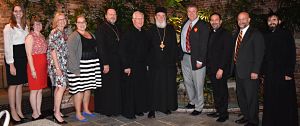At dear old State U, you might find a Christian engineering professor, carefully quiet, and more than one Christian coach on the playing fields, but you will be hard pressed to find the views of the world’s two billion Christians elsewhere. Much of undergraduate education, at even our best schools, is not worth the money people will borrow, being more about getting the “union card” into the establishment than what a person will actually learn.
I have heard from numerous students that they worked harder in high school to get into the elite school than they had to work in their general education classes, usually the most politicized, to stay there. In fields with “reality constrained” content, such as mathematics and the sciences, Christians can fare well. In such programs the quality of the work in the lab or the classroom will trump any eccentric views the student has at home.
Any number of students have been able to put up with the mild chaff that comes with being a Christian or Republican (or Heaven protect us: both) at school. The best tactic is to do good work, be kind, and learn. You can always store up some amusing anecdotes for later. As Sheldon Vanauken wrote to me in college: “Keep your head down and give them both barrels as you go out the door.”
We should also not stress too much about the trauma of being a minority in school. Safe to say, there were not too many Reagan Republicans at the University of Rochester philosophy department while I was there. Once while sitting with a left-of-center female Christian grad student, a professor came into the grad office and said: “Look! Our token fundamentalists!” Safe to say, he saw little difference in our very different religious outlooks. Yet I can honestly say that I was treated more than fairly in my secular grad school. Those were hard years for me personally and the faculty was very patient with me. My views were treated with more respect than they deserved (at times) and I learned that opposition, rigor, and even hostile examination of my ideas was good for me.
The University of Rochester philosophy department is not responsible for my eccentric philosophical or religious views, but they are greatly responsible for any clarity or breadth of thought I possess. If we do not like “grievance” politics, then we cannot participate in it and when treated fairly, should be quick to praise true liberalism.
Not every school is as fair as Rochester in creating a learning community and being open to dissenting views. My perception from former students is that the situation is growing worse for traditional Christians in schools . . . especially schools on the lower ends of the academic rankings. I know scholars whose careers probably have died over their Christian convictions, though this is nearly impossible to prove. The embrace of administrators of the (disputable) view that gender is merely a social construct distinct from sex with the corresponding codes has made things harder for Christian groups on campus.
As a result, this could be a moment of opportunity for traditional Christian colleges. Sadly, the pressure of accreditation and the socialization of graduate training has left the best Christian colleges relatively weak in terms of Christian commitment. Notre Dame is a very fine school with relatively strong research and a Christian commitment, but the experience of students there and at schools like Notre Dame is very mixed. Some departments are more hostile to traditional Christian ethics at such schools, though one is always more likely to find a Christian mentor.
Schools still connected to the Catholic church or Protestant denominations are often more intent on being “welcoming” and “inclusive” to avoid being thought of as fundamentalist.
What of Evangelical and smaller Catholic colleges and universities? Undergraduate education is often as good or better at some of these schools than at “prestige” schools. They are also slowly taking on more graduate education. Biola University, where I started my teaching career, and Wheaton College, where my wife graduated, are two excellent examples. The King’s College in New York City is engaging with the business and cultural capital of the world. Thomas Aquinas College offers one of the best great books educations available. There is no reason for a Christian parent to send their undergraduate students to State U if the student is in a field that requires graduate school. They can get a first-rate education at a Christian college and then go to graduate school at the “name brand” with little difficulty if they pick the proper Christian college.
Such schools are struggling to find students and all of us who are conservative or traditional Christians have a vested interest in strengthening them. However, there are some good reasons for these schools to struggle. Some are very weak and probably cannot be saved from the higher education bubble. There are schools that are anti-intellectual and essentially unaccredited making it harder for students to attend graduate school. Others have become inbred or have the same administrative bloat as State U.
We should begin by refusing to monetize the ministry of education. We are shaping souls for Paradise, not making money for our own grand visions or academic empires. We must never tolerate the kind of ghostwriting, puffed credentials, or lack of care that impacts too much of the Christian Media Complex.
Here are five things Christian schools should do now, and Christian students and parents should examine schools they plan to attend:
Get regional accreditation.
If you attend a regionally accredited school, then you will have a degree that receives a modicum of respect. A school without regional accreditation may be good, but it may be very narrow. Check the faculty lists. A bad sign is if most faculty at the school went to the same one or two schools.
All our schools should seek regional accreditation while available, but also begin to prepare for the time when secular schools may cast us out by strengthening new accountability groups.
Put student life back in the hands of academics.
Christian colleges should commit to having co-curricular activities, including athletics, as part of the academic program. We need to shrink auxiliary departments and make those departments part of the academic life of the school.
Tip to students: Google the people in the student life area. Find out their views on the social issues of the day. Check out the psychologists and sociologists. Use Facebook and Google. This will tell you the campus climate for conservative Christians very quickly.
Tip to parents: Fear the Christian school that sells to the right and teaches to the left. This happens all the time. The leadership of the school may be traditional, while all the young profs and student life folk mock the benighted administration.
Most activities at your school should come from the professors and the students. Look for schools near urban centers: think jobs, culture, and fun.
Never allow more vice-presidents than there are faculty in any single major.
Administrative bloat is a fatal sign. Christian colleges should commit to spending at least fifty percent of tuition revenue in the academic area. We should commit to fewer than fifteen percent of classes in any area being taught by part-time teachers.
Tip to students: Give no school your money without reading the 990 and comparing administrative pay to faculty pay. Too big a gap and you have trouble. Ask what percent of the money goes directly to academics (usually the Provost or Academic Vice-President). If the number is less than fifty, worry.
Tip to parents: Google through school leadership? How academic is it? Are professors really in charge or are they employees in a monetized venture? If there is no tenure, this can be a very good sign if turnover is low.
Christian schools should commit to having low turnover and learning communities where appropriate participation in decisions and forming of vision are shared from Board to the most junior professor.
On-line programs must have the same quality as on-site.
The day may come when on-line schools are as excellent, but that day is not yet here. Too often on site schools are dragged down by the reputation of on-line programs. Christian schools must commit to the same or similar student/teacher ratios online as on site. We must commit to similar retention numbers. We must not encourage borrowing to attend these programs.
Can you get a good education at an accredited online program? You can, but it requires a particular type of student with strong exterior support.
We must drive the debt out of Christian education.
Christian colleges must innovate to become affordable. Let’s set a goal of charging no more than twelve thousand a year in tuition by 2020 in at least some of our quality programs.
Tip to students and parents: While you wait for debt free education, use this rule of thumb: don’t borrow more money for your whole degree than you would spend on a new car. Don’t buy a new car until your loans are paid off.

The rest of my career is dedicated to making these things happen at schools like Houston’s new The Saint Constantine School. The visionary leadership there is committed to excellence, affordability, and an unchanging commitment to the Orthodox Christian faith. We will be welcoming to all people . . . and challenge all our ideas in the classroom. . . but in a classic context. There are other good places out there . . . lights in a dark time. Biola, Wheaton, Kings, Thomas Aquinas, Hellenic College are all exciting places amongst many others. Encourage them and pray for us!












